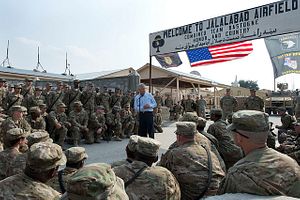After U.S. Vice President Joe Biden’s trip to speak with America’s friends and rivals in northeast Asia, Chuck Hagel found himself in Kabul over the weekend and in Islamabad today. His visit to the latter marks the first visit by a U.S. Secretary of Defense to Pakistan in almost four years as well as the first since the controversial U.S. raid in Abbottabad to kill Osama bin Laden in 2011. While Biden had a difficult time in Beijing, Seoul, and Tokyo in the wake of the recent Air Defense Identification Zone, he had the luxury of addressing issues that were overt and urgent. Hagel has no such luxury in his conversations with Pakistan’s two Sharifs — Nawaz and Raheel.
The top agenda item for Hagel in Pakistan included the U.S. drone program — an issue of perennial controversy in the country and a political sticking point for Nawaz Sharif who pledged to rein in the U.S. drone program in his election campaign. A statement by the Pakistan foreign ministry said that Sharif “conveyed Pakistan’s deep concern over continuing U.S. drone strikes, stressing that drone strikes were counter-productive to our efforts to combat terrorism and extremism on an enduring basis.”
Most central to the Pentagon’s interests in the short-term is the issue of the Pakistani Ground Lines of Communication (GLOC) that serve as an important artery for the United States and its coalition partners to extract machinery and equipment from Afghanistan. The recent surge of anti-American protests, spearheaded in Khyber Pakhtunkhwa by Pakistan’s Tehreek-i-Insaf (PTI) political party, has disrupted cargo activity along the GLOC; the United States “voluntarily halted” these operations after PTI’s protests. Reuters reports that Hagel “praised operations” by the Pakistan military in reigning in the protests along the Torkham-Peshawar road.
Hagel, for his part, sought to continue to deepen the U.S.-Pakistan partnership and express the continued commitment of the United States to supporting Pakistan’s military. His visit was timed well, coming a week after General Ashfaq Kayani stepped down. Hagel met with his successor, General Raheel Sharif, Pakistan’s Chief of Army stuff until 2019. Reuters cites an anonymous U.S. defense official who further adds that one of Hagel’s objectives would be to foment better ties between Afghanistan and Pakistan ahead of the 2014 troop drawdown. The official added that regional stability would be improved by better Kabul-Islamabad cooperation “because of the unique nature of its porous border and the presence of a variety of militant groups in the AfPak border region.”
To this end, the Kabul leg of Hagel’s travels to South Asia focused on the Bilateral Security Agreement (BSA) which saw major setbacks due to Hamid Karzai’s intransigence over the conditions contained within the proposed text. The BSA would set the terms for U.S.-Afghan cooperation after the formal withdrawal of coalition troops in 2014 and, if it fails to be signed, the United States may opt to implement a “zero option” — leaving Afghanistan entirely. Hagel — who did not meet with Karzai in Kabul — received assurances from top Afghan defense officials that the BSA would be signed in due time. Hagel proposed a February deadline for the BSA — the date of the next high-level NATO meeting. The BSA would see a marginal U.S. troop presence remain in Afghanistan beyond 2014 to train the Afghan National Army (ANA) and conduct counter-terrorism operations.
Back in Islamabad, as Hagel discusses a plethora of controversial issues with Pakistan’s Prime Minister, neither will be able to acknowledge the truly insidious forces inhibiting the pursuit of the objectives put forth in official statements. As I’ve written before, Pakistani grand strategy, as interpreted by the entrenched military-intelligence establishment, led by the Inter-Services Intelligence (ISI), is fundamentally not in sync with U.S. interests. The U.S. vision of a peaceful Durand Line, where the Pakistani and Afghan governments and militaries cooperate against militancy and terrorism, is anathema for Pakistan’s military and has been, largely since the 1950s (as historian Michael Barry documents).
Both Nawaz Sharif, who faced a coup in 1999, and Chuck Hagel are well acquainted with the threat posed by the long-entrenched Pakistan military and barriers in making sense of the U.S.-Pakistan relationship. The Afghan Bilateral Security Agreement will ensure that the Pentagon has a few more years to attempt to build a sensible recasting of the partnership with Pakistan’s two Sharifs. Raheel Sharif, who has been in office as Chief of Army Staff for just over a week, remains a wildcard. For U.S. interests to succeed in Pakistan, Sharif and the Pakistan military will have to cast their sights away from Kashmir and Kabul and towards the internal threat of militancy.

































